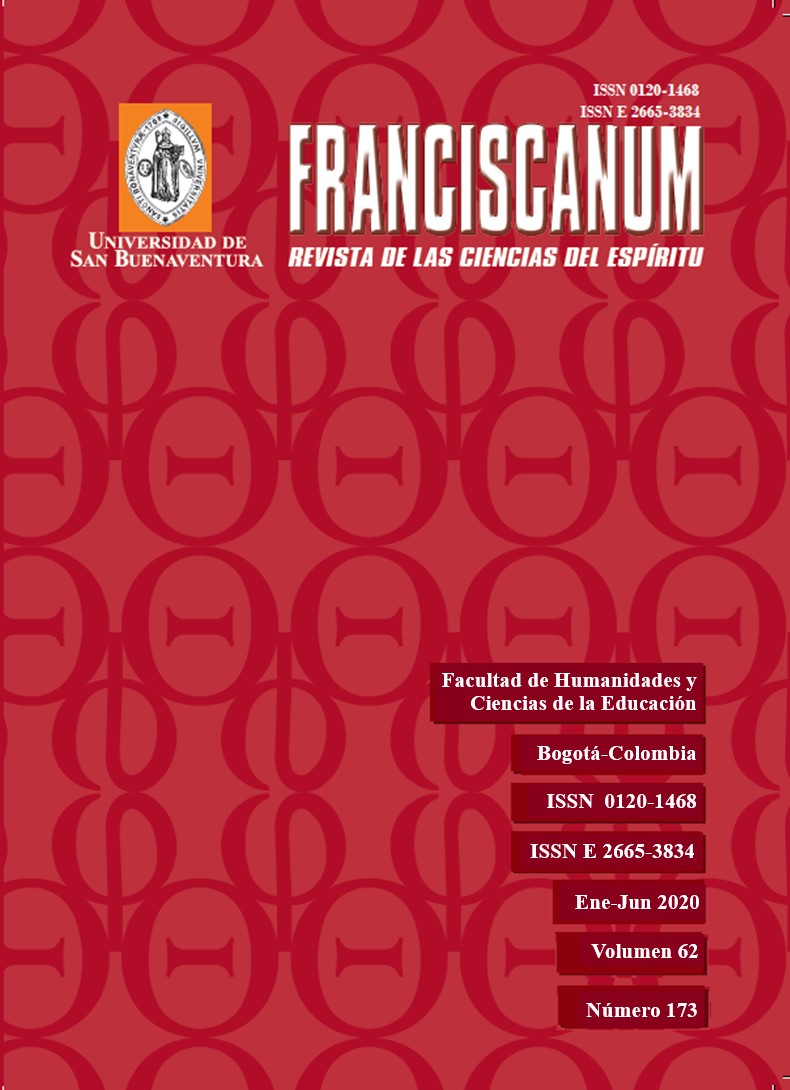This journal provides immediate open access to its content, based on the principle that giving the public free access to research helps a greater global exchange of knowledge.
Therefore, the Creative Commons 4.0 Attribution Attribution - Equal Share (by-sa) License is accepted: The commercial use of the work and the possible derived works is permitted, the distribution of which must be done with a license equal to that regulates the original work.
http://creativecommons.org/licenses/by-sa/4.0/
Along these same lines and in line with the Open Access policy, it is clarified that the authors maintain their rights to articles, without restrictions and, in the same way, they maintain their publication rights, without restrictions. They are only asked to reference the number of the Franciscanum magazine where the article initially appeared.
Abstract
This article assumes the idea that in order to overcome the environmental crisis we are experiencing, it is not enough to develop more technology and more science, but that it is also necessary to rethink and modify our relationship with nature. As eco-philosophers hold, it is necessary to overcome a mechanistic ontology centred on a strong anthropocentrism that dualistically contrasts man to nature, and that understands nature as a mere property at the service of human beings. Nonetheless, while eco-philosophies usually propose a relational ontology, my hypothesis is that not only this ontology can function as a basis to rethink and modify our relationship with nature, but that the classical metaphysical doctrine of the degrees of being can serve as the basis for a new ecological paradigm as well.
References
Bugallo, Alicia Irene. «Ontología gestáltica y experiencia de lo divino en Arne Naess; esbozos de una fenomenología profunda». En Trascendencia y Sobreabundancia. Fenomenología de la Religión y Filosofía Primera, editado por Juan Carlos Scannone, Roberto Walton y Juan Pablo Esperón, 321-336. Buenos Aires: Biblos, 2014.
Bugallo, Alicia Irene. «Ontología relacional y ecosofía en Arne Naess». Nuevo Pensamiento 1 Vol. I (2011): 151-174.
Leibniz, Gottfried. «Carta a Huygens, Dic. 29, 1691». Citada por J. J. MacIntosh y Peter Anstey en Robert Boyle, The Stanford Encyclopedia of Philosophy (2014), editado por Edward N. Zalta. Consultada en marzo 18, 2019. www.plato.stanford.edu/archives/fall2014/entries/boyle/>.
Leopold, Aldo. «La Ética de la Tierra». Ambiente y Desarrollo 1, Vol. 23 (2007): 29-40.
Marcos Martínez, Alfredo. «Política animal. El “Proyecto Gran Simio” y los fundamentos filosóficos de la biopolítica». Revista Latinoamericana de Bioética 12, Vol. 7 (2007): 60-75.
Mathews, Freya. «Ecological philosophy». En Routledge Encyclopedia of Philosophy, editada por Tim Crane y Edward Craig. Consultada en mayo 10, 2018. www.rep.routledge.com/articles/thematic/ecological-philosophy/v-1/bibliography/ecological-philosophy-bib. doi: 10.4324/9780415249126-N017-1.
Naess, Arne. «The Shallow and the Deep, Long-Range Ecology Movement. A Summary». Inquiry, Vol. 16 (1972): 95-100.
Rozzi, Ricardo. «Ética ambiental: raíces y ramas latinoamericanas». En Fundamentos de Conservación Biológica: Perspectivas Latinoamericanas, editado por Richard Primack, Ricardo Rozzi, Peter Feinsinger, Rodolfo Dirzo y Francisca Massardo, 311-362. México: Fondo de Cultura Económica, 2001.
Sanguineti, Juan José. Neurociencia y filosofía del hombre. Madrid: Palabra, 2014.
Stein, Edith. La estructura de la persona humana. Madrid: BAC, 2007.
Stein, Edith. Ser finito y ser eterno. Ensayo de una ascensión al sentido del ser. México: Fondo de Cultura Económica, 2002.
UNESCO. El Correo de la UNESCO. París: UNESCO, abril-junio 2018. Consultada en mayo 13, 2019. https://es.unesco.org/courier/2018-2
White, Lynn. «Raíces históricas de nuestra crisis ecológica». Ambiente y Desarrollo 1, Vol. 23 (2007): 78-86.
Wildman, Wesley J. «An Introduction to Relational Ontology». En The Trinity and an Entangled World: Relationality in Physical Science and Theology, editado por John Polkinghorne y John Zizioulas, 55-73. Grand Rapids: Eerdmans, 2010.




















